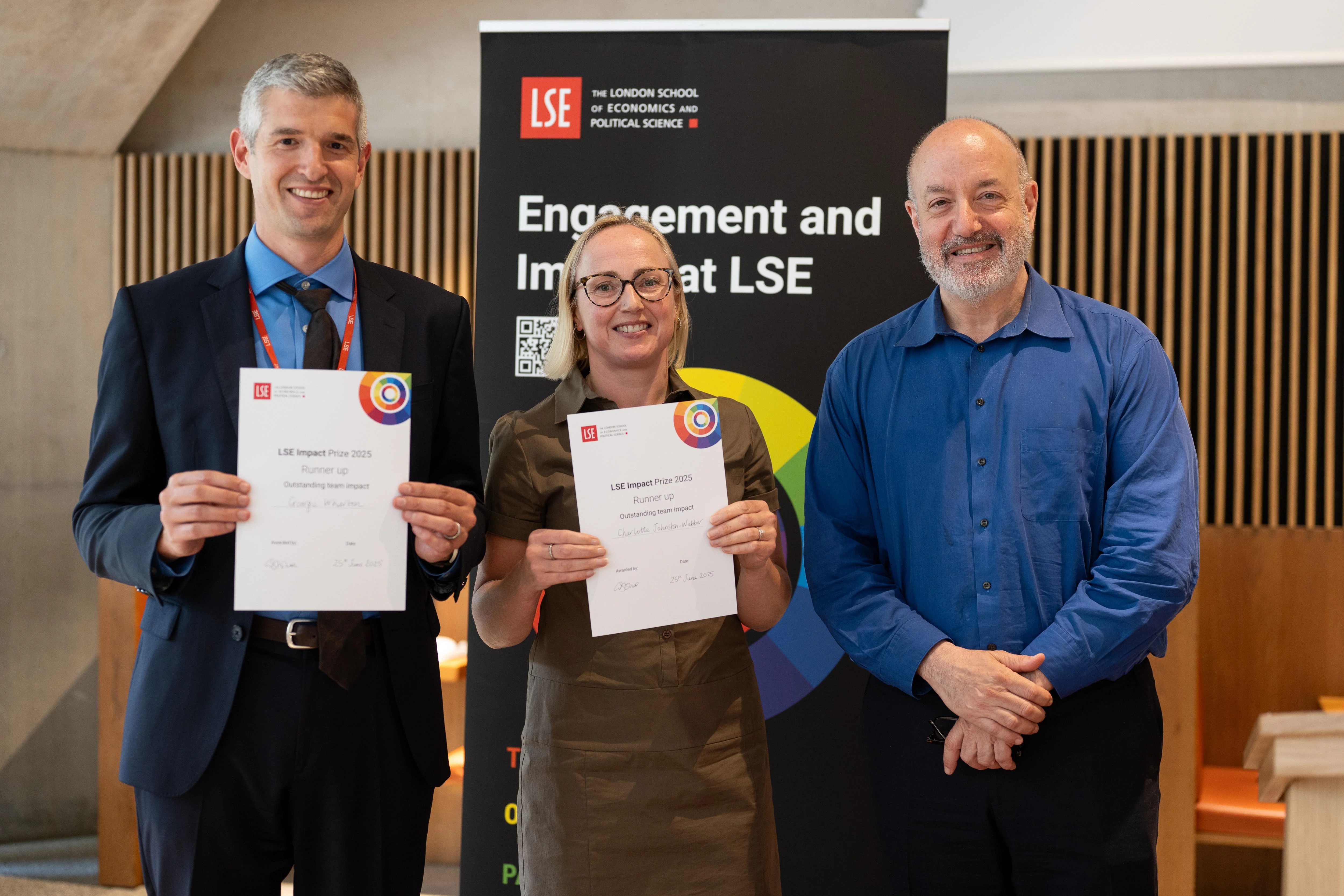Researchers Recognised by LSE Impact Awards for Transforming Greece's Organ Donation System
Professor Elias Mossialos, George Wharton, and Dr Charlotte Johnston-Webber have been recognised as runners-up in the "Outstanding Team Impact" category of the LSE Impact Awards for their work addressing Greece's chronic organ donation shortage. The study contributed to legislative reforms that have more than doubled Greece's organ donation rates, from 45 deceased donations in 2018 to a record 100 in 2024.
The research addressed a significant public health challenge. Greece had historically performed 75% fewer kidney transplants per million population than the European average, leaving thousands of patients on lengthy waiting lists with diminished prospects of receiving life-saving treatment.

Photo of George Wharton and Dr Charlotte Johnston-Webber receiving certificates from Larry Kramer
Comparative Analysis Drives Reform
The LSE team conducted a comprehensive analysis of successful organ donation systems across five European countries (Spain, the United Kingdom, Italy, Portugal, and Croatia) to identify best practices that could be adapted for the Greek context. Through consultation with 25 stakeholders including transplant clinicians, patient advocates, bioethicists, policy experts, religious leaders, and media representatives, the researchers then identified critical gaps in Greece's existing system: inadequate governance structures, insufficient resources, unclear protocols, and limited public engagement.
Their recommendations were directly incorporated into Greece's Law 5108/2023, which restructured the National Transplant Organisation and established new quality standards frameworks, reimbursement mechanisms, and donation coordination protocols.
Measurable Impact on Healthcare Delivery
The legislative changes have produced substantial organisational improvements. Thirty-two intensive care units now actively participate in organ donation programmes, compared with fewer than 10 previously. Seven dedicated donor coordinators have been hired and stationed in ICUs nationwide a structural reform the research identified as essential for effective system coordination. The improvements enabled 225 life-saving transplants and 106 living donations in 2024, marking the fourth consecutive year of increased donation rates.
"This is a breakthrough that will give hope to thousands of our fellow citizens living day-by-day in fear and anxiety waiting for a transplant," said Prime Minister Kyriakos Mitsotakis when the reform plan was announced.
Anthony Papadimitriou, President of the Onassis Foundation, which supported the research, said the work "places at its very heart people, physicians, nurses and patients... heralding a new era for organ donation and transplantation."
Academic Research Meets Policy Implementation
The LSE Impact Awards recognise research that demonstrates exceptional translation from academic study to real-world application. The Greece project exemplifies this approach, showing how systematic comparative analysis can inform evidence-based policy development.
Professor Mossialos and his colleagues identified four key elements required for successful organ donation systems: strong governance, adequate resources, clear protocols, and robust public engagement. Their methodology combined international best practice analysis with detailed local stakeholder consultation to ensure recommendations would be both effective and culturally appropriate.
The transformation has implications beyond Greece's borders. The case study now serves as a template for other countries struggling with similar challenges in organ donation and transplantation programmes, demonstrating how rigorous academic research can drive systematic healthcare reform.
The recognition reflects LSE Health's commitment to conducting research that addresses pressing societal challenges. As Greece continues to build on these improvements, with donation rates showing sustained growth, the project illustrates the enduring impact that well-designed academic research can achieve when effectively translated into policy and practice.